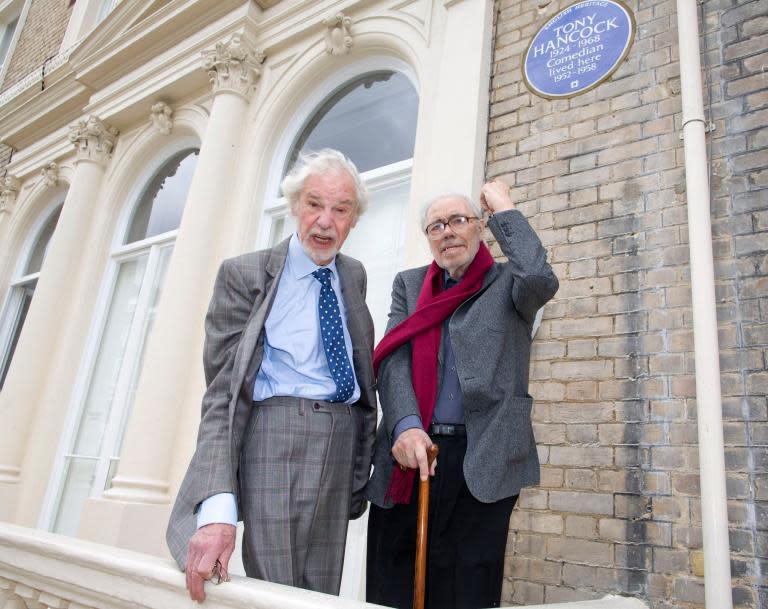Ray Galton death: how comedy writing legend began with a meeting in a TB ward
It was a comedy writing partnership that could have been formed in heaven.
In fact, Ray Galton met Alan Simpson in the decidedly less cheery surroundings of a TB ward in 1948.
Neither 18-year-old had been expected to live very long. Simpson had at one point received the last rites, and Galton had been given just weeks to live.
Yet they both survived to become regarded as the fathers and creators of British sitcom.
Galton and Simpson were responsible for 164 episodes of Hancock’s Half Hour across radio and television, the sitcom classic Steptoe and Son, and more than 600 comedy scripts.
Though Galton’s death aged 88 at the weekend comes 17 months after the passing of Simpson, it is hard to imagine that the lines they wrote will ever stop getting laughs.
As befitted the place where it all began, theirs was a wry humour that never missed the chance to defy misfortune by getting a laugh out of it.
“Friends all over the world,” they got Tony Hancock to say. “None round here, but friends all over the world.”
Then there was Harold Steptoe’s monologue on “the Englishman’s panacea, a cup of tea”: “Mother just died? Oh what a shame, have a cup of tea. Just been run over? Never mind, have a cup of tea.
“I have been offered tea for disasters, funerals, operations, floods, wars, Dunkirk, the Blitz, coronations, piles, hysteria, hunger marches and insomnia. Nice cup of tea in one hand and thumbs up to the camera in the other ... Britain can take it! Well they can have it."
Their 70-year writing partnership began even before they left the TB ward.
Speaking to The Independent in 2009, Simpson recalled: “We suggested the hospital's radio station do a comedy show.
“‘Well, you do it,’ they said. So we sat down and came up with an idea called ‘Have you ever wondered ...’ – situations such as what would happen if doctors became patients and patients became doctors.”
They “dried up” after just four sketches – but not before the two 18-year-olds had come up with some pretty good stuff, like the line about “Jane Russell pontoon … It's the same as ordinary pontoon, only you need 38 to bust!"
About a year after they left Milford Sanatorium in Surrey, they sent the BBC a script about the pirate captain Henry Morgan. They received a near-instant reply from the BBC to the effect that people within the corporation were “highly amused”.
By 1951 they had given up their day jobs. Galton’s had involved working for the Transport and General Workers’ Union; Simpson had been a shipping clerk.
By 1952 they were writing for Tony Hancock, and some of the comic greats of the era were giving them perhaps the best compliments a humour writer can receive.
“When we had readings with Hancock, Sid James, Kenneth Williams and Bill Kerr,” recalled Simpson, “They would be on their knees roaring [with laughter], eyes watering. It was incredible, and Ray and I would stand there like kids thinking, ‘We did that.’”
After they parted ways with the troubled Hancock, the BBC, keen to keep hold of such talent, offered Galton and Simpson the chance to write whatever they wanted.
Their fourth script, titled The Offer was about a pair of rag-and-bone men.
“You know what you’ve got here?” Tom Sloan, the BBC’s head of light entertainment told them. “This is a series.”
The first episode of Steptoe and Son aired in June 1962.
This weekend – after Galton died peacefully, surrounded by his family, following what was described as a “long and heartbreaking battle with dementia” – his friend and manager Tessa Le Bars called it the end of an iconic era.
“They were regarded as the fathers and creators of British sitcom,” she said. “[Their] legacy will endure, inspire and bring laughter to the nation for evermore."
Even in semi-retirement, the two friends continued to share jokes. They lived close to each other in Hampton, south-west London, and when Simpson's cleaning lady “kicked him out” on Monday mornings, he would go round to Galton’s for coffee.
In 2016, a Telegraph interviewer noticed how “their conversation is like dialogue, each finishing the other's lines, and the exchanges have a rhythm that would be instantly recognisable to fans of their classic scripts”.
Some suggested they deserved more official honours than the OBEs they received in 2000.
Their fellow professionals certainly recognised how Galton and Simpson’s output was way above the bland writing that sometimes passes for sitcom fare.
After going to see Harold Pinter’s play The Caretaker when it was first performed in 1960, Hancock admitted to finding it hilarious, but declared himself puzzled about the awe in which the Nobel Prize-winning playwright was held compared to the two comedy writers.
“I don’t understand it,” he told Galton and Simpson. “You’ve been writing this stuff for ages!”
Attempting to explain the enduring appeal of their “stuff” in 1996, Simpson told The Independent: “The characters we write are not of any particular era. Their attitudes have been around for 2,000 years. It's about people aspiring to better themselves.
“The Hancock character is there in Dickens. People can still identify with these characters, they're recognisable. The same applies to Steptoe.”
Meanwhile, in a remark that seemed to recall how it all began in a TB ward, Ray Galton revealed the attitude that had allowed two writers to find comedy gold in the frustrations of Hancock and the miseries of a couple of rag-and-bone men.
“Obviously,” he said, “You don't have people coughing up their lungs and dying – but anything can be made funny."

 Yahoo News
Yahoo News 

